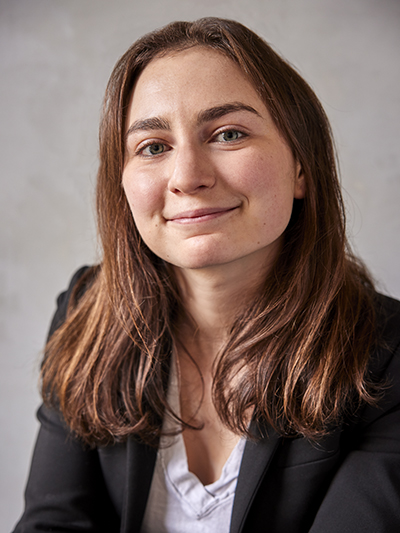Tova is a junior in the College of Arts and Sciences studying Biochemistry and Comparative Literature. Her research interests encompass total organic synthesis and drug discovery alongside the Russian Avant-Garde, namely, the volatility of art and language in Russian Futurism; she also dabbles in Marxian theory. Just as organic chemistry provides the building blocks for novel biological molecules, Tova finds that Soviet-era art and literature yield the tools to synthesize novel perspectives of the past. In five years, you will probably find Tova in one of the following pursuits: studying to obtain a medical degree (following in the footsteps of one of her favorite authors, Mikhail Bulgakov), working as a paragliding instructor in Switzerland, performing in Cirque du Soleil, or any combination of the above. Outside of her studies, Tova enjoys training in circus arts (particularly rope, trapeze, and silks), hiking with her dog, Charley, and reading outdoors.
Tova Tachau
Wolf Humanities Center Undergraduate Fellow
2023—2024 Forum on Revolution
Tova Tachau
Biochemistry, Comparative Literature, Russian and East European Studies
The Futurist Dynamism of Dimensionality: Embryos of Artistic Possibility in Malevich and Khlebnikov
"We are destroying your old world," declared Futurist poet, Vladimir Mayakovsky, to a captive audience at The Moscow Society of Art Lovers in 1913. Indeed, with Tolstoy and Dostoevsky thrown "overboard from the ship of Modernity," Russian Futurism exhorted a break with the aesthetic confines of preceding generations and an embrace of the urbanism and technology of the early 20th century, epitomized in their aptly named manifesto, "A Slap in the Face of Public Taste" ("Poshchechina obshchestvennomu vkusu"). Iconoclastic, dynamic, and provocative, Futurists revolutionized the very fundamentals of literature and art: consonants became color and texture, vowels became time and space, and geometric planes became pools of pure intuition. Through Kazimir Malevich’s advent of Suprematism, a method of non-objective creation, and Viktor Khlebnikov’s experimentation with zaum, or 'beyonsense' language, both artists invented novel dimensions to expand the human perceptual apparatus beyond the confines of the phenomenal world and, in doing so, freed creative intuition from the shackles of utilitarian reason. This project queries the role of dimensionality in these figures' respective approaches to a revolutionary reconceptualization of art as such. Both Futurists thus imbue their art with the revolutionary potential to escape existing dimensions and model new phenomenological frameworks: "economy" and zaum, respectively. Through an interdisciplinary comparison of these manifestations of dimensionality—via both authors' theoretical writings, Malevich's visual works, and Khlebnikov's poetry—this project argues that Malevich and Khlebnikov's invention of novel dimensions succeeds in expanding the human perceptual apparatus via two disparate, though interwoven, paths of creative intuition which lead beyond the utilitarian world into a nebulous cosmos of primordial, spiritual, and transcendental significance.



